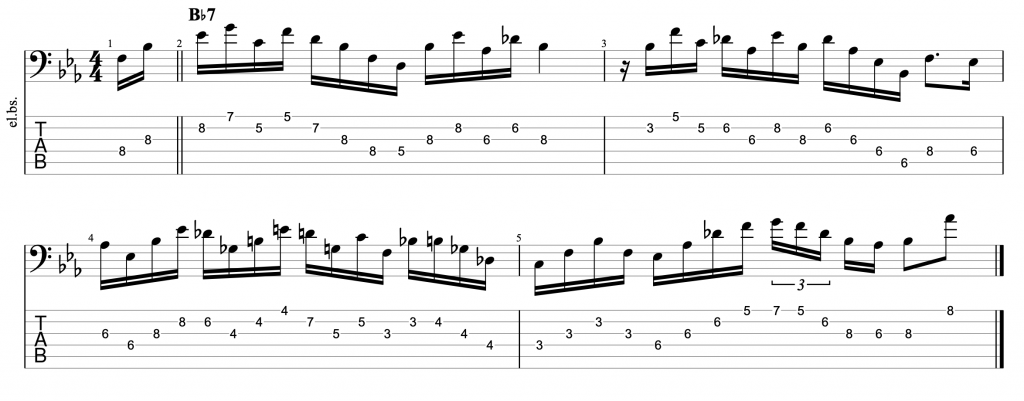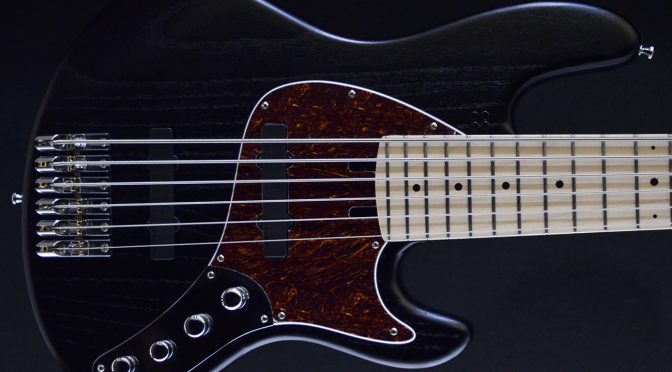Freedom Jazz Dance – Melody on 6-String Bass Guitar – Bass Practice Diary – 9th March 2021
Miles Smiles has been one of my favourite Miles Davis albums for a long time. The most famous composition on the album is probably Footprints by Wayne Shorter. Which is a minor blues that has become a staple of jazz jam sessions. Today, I’m looking at another track on that album Freedom Jazz Dance.
The Second Great Miles Davis Quintet
The Miles Davis band at that time (1966) contained four young musicians who would go on to become some of the most important figures in modern jazz. Herbie Hancock, Wayne Shorter and Tony Williams are all great composers as well as improvisors and band leaders. So, it was a little bit unusual for them to record a tune that was written by someone who wasn’t in the band.
Freedom Jazz Dance was written by a tenor saxophonist called Eddie Harris. He had recorded the tune himself a year earlier. When you listen to the Eddie Harris version of Freedom Jazz Dance, you quickly realise that the Miles Davis band has completely reconceptualised and recomposed the tune. Harris’ version is built on a funky groove between the bass and piano on a Bb7 chord. The melody is played in one continuous sequence with three phrases.
In Miles Davis’ version of the tune, the melody is broken down into the three phrases. They are separated by space to improvise for the rhythm section. Initially only by bass and drums. When the melody is repeated, Herbie Hancock begins to interject chord voicings. The Bb7 harmony from the original is retained, but the funky groove is gone and replaced by an altered dominant sound, and a much freer and more improvised approach to the groove.
Ron Carter
I think Ron Carter is one of the most important bass players in the history of jazz. He started his career as a classically trained cellist, who struggled to get work in touring orchestras at the time due to racist segregation laws in the Deep South. So, he made the switch to jazz double bass and became one of the most prolific musicians of the second half of the twentieth century. According to his wikipedia page, he has appeared on over 2,200 recording sessions, making him one of the most recorded musicians in history.
He still plays today at age 83 and I’ve been fortunate enough to see him perform live on a couple of occasions. The first time in 2003, when I was still a teenager, he was leading a quintet of much younger musicians. He had adopted the Miles Davis role as senior member mentoring the young talent. It was a truly memorable gig. I can still vividly remember the rendition of Flamenco Sketches that they played that night. It sent shivers down my spine. After that I saw him play one more time in a drummer-less jazz trio featuring guitarist Russell Malone and pianist Mulgrew Miller. It was musicianship of the highest caliber.
When I listen back to Miles Smiles, which I have been doing this week. It reminds me what an incredible musician he is. I think the partnership he shared with drummer Tony Williams was one of the most brilliant and innovative rhythm sections in jazz history. There are good reasons behind why the members of that band went on to become some of the biggest stars in modern jazz.
Why Learn a Jazz Tune on Bass?
I know some bass players might not agree, but I think it’s important to learn to play melodies. I think bass players are often guilty of only looking at the chords and not thinking much about the melody. This tune is a great demonstration of why that approach won’t always work. There is only one chord here, Bb7. If you only look at that, it doesn’t tell you anything about the composition. Only once you look at the melody will you understand the composition.
From a purely technical perspective, learning jazz melodies will also help to build your technique on bass. And it will also help you learn about jazz phrasing and vocabulary. I would suggest that anyone wanting to learn how to improvise in a jazz style, needs to learn as many jazz tunes as possible. Here is how I play the Freedom Jazz Dance melody on 6-string bass.


